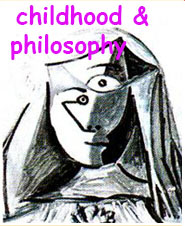questions and performatives - communities of inquiry as conventional contexts
DOI:
https://doi.org/10.12957/childphilo.2018.30843Keywords:
communities of inquiry, questions, performative languageAbstract
‘Philosophy for Children’, firstly proposed by Matthew Lipman, aims to nourish both critical thinking and argumentative ability of participants. This model conceives of children as a crucial resource for social development: their thought is supposed to be free from undisputable dogmas and theories. Therefore, their questions about philosophical issues can shed new light on them, or even underline some contradictions of the adult-like society, that we unconsciously tend to disregard. The philosophical background of P4C pushes for an in-practice philosophy, highlighting the value of critical thinking and ambitious questioning against a docile acceptance of well-established theories (and social practices). Yet, a radical interpretation of this claim results in a widespread relativism that would mislead models such as P4C from their own goals. In this paper, resulting from the observation of several P4C sessions, I argue that, although they are supposed to be cross-sections of social environments, communities of inquiry as defined by Lipman are conventional (ceremonial) contexts: the sentences pronounced within the community, are highly performative. Moreover, the quality of research crucially rests on the epistemic openness of a jointly-chosen question, that influences the following discussion. However, sometimes social and cultural differences among participants are not completely erased within heterogeneous communities of inquiry. Hence, by rejecting the radical interpretation, I propose a methodological integration to the standard P4C model, that could assure both participation and epistemic openness even in heterogeneous communities.Downloads
Download data is not yet available.
Downloads
Published
2018-09-13
Issue
Section
dossier



